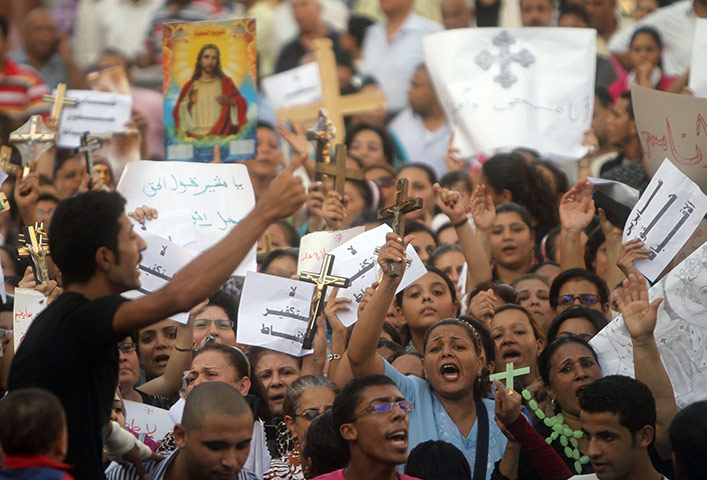
Cairo witnessed an outpouring of support on October 9th, as thousands of Muslims and Christians marched to the state radio and television building in Cairo to commemorate the 28 Christian protesters who had been brutally killed one year earlier in the Maspero massacre. The scene was reminiscent of the aftermath of the bombing of a church in Alexandria on New Year’s Eve in 2011, one which brought out the best in the Egyptian people. Egyptians from a wide range of political and social backgrounds paid their respects as prominent figures and political parties issued statements in memory of the victims killed during clashes between mostly Christian protesters and the army. However, the goodwill emanating from the aftermath of these tragedies has not been indicative of sectarian tensions that Egypt still faces. Instead, government inaction and culpability of the security apparatus are constant elements in many issues relating to Egyptian Christians in post-revolution Egypt.
Over the past two years there have been numerous reported incidents of the displacement of Coptic families from their homes. Last month, Christians living in Rafah were pressured to temporarily relocate from the northern Sinai city to nearby al-Arish after distributed flyers threatened the community with violence. Shortly afterwards unknown gunmen opened fire on a Christian-owned business in Rafah. When the warnings came to the attention of the governor of North Sinai, following routine initial denials, he recommended that they heed the threats and leave, rather than provide security to the citizens of his governorate. The government elected to facilitate the displacement.
In July approximately 100 Christian families fled the Giza village of Dahshur when a fight between a Christian and Muslim escalated, with Christian homes and businesses targeted. Security was nowhere to be seen until damage reached staggering levels.
In both cases, the government took a surprisingly reactive approach after the incidents had been reported by news outlets and deplored by human rights organizations. Christians returned to their homes in Rafah after attention was brought to the office of President Mohamed Morsi. Dahshur Copts came back to find their homes and businesses looted. In both cases, some families opted not to return, doubting the government’s commitment to provide adequate security.
Between Rafah and Dahshur, the latter better represents most incidents of forced evictions of Egyptian Christians, in which collective retribution is sought for the alleged action of one individual.
Authorities have either demonstrated incompetence or deliberately ignored deep-rooted sectarian problems in Egypt. Former Freedom and Justice Party (FJP) Member of Parliament Amr Darrag blamed the media for blowing clashes in Dahshur out of proportion in an effort to escalate sectarian tensions. Fellow FJP member Mohamed Ibrahim argued that the clashes were caused by a personal fight, confirming that from his point of view the incident could not be categorized as sectarian at all. Both officials ignored the fact that collective retribution had been sought on private citizens, with one common thread tying them all together – their religious beliefs.
The same reactive approach was taken when eight Christian families were expelled from their homes in Amereya following violence stemming from an obscene video a Coptic man allegedly had on his phone of a Muslim woman. A local reconciliation committee agreed that, for peace to be instilled, the families had to be banished. A commission of parliamentarians acted only after progressive parties and human rights groups issued statements, protesting the developments.
On the one-year anniversary of the Maspero massacre, the Egyptian Initiative for Human Rights (EIPR) released a report entitled Copts under Military Rule [Arabic] in which the organization condemned the Supreme Council of the Armed Forces [SCAF] for not adequately addressing an increase in sectarian tensions. “[SCAF] did not have a clear and complete vision to deal with the issue of sectarian tension and violence,” read the report. “It does not seem to posses a real will to develop fundamental solutions, and therefore did not use legislative power to address the problem of building churches or discriminatory practices in society.”
During the first 100 days of Morsi’s government, a similar handling of sectarian strife would indicate that little has changed. Issues that lead to collective retribution against minorities are multifaceted and run deep in Egyptian society. Until government security takes a proactive approach to diffuse tensions, sectarianism will continue to fester. And until the Egyptian government acknowledges that such problems exist, the country’s leadership will continue to fail to solve a problem that it either knowingly or unknowingly ignores.
Basil El-Dabh is a reporter for Daily News Egypt. He graduated from Georgetown University with a Bachelor of Arts degree in Political Economy. He is an Egyptian American and moved to Cairo in 2010.
Photo Credit: EPA
Image: coptic%20protest.jpg
